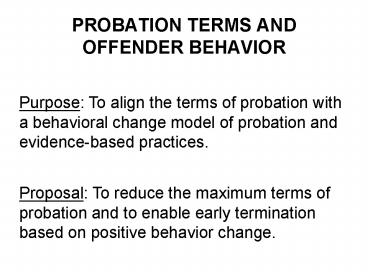PROBATION TERMS AND OFFENDER BEHAVIOR - PowerPoint PPT Presentation
Title:
PROBATION TERMS AND OFFENDER BEHAVIOR
Description:
... rearrested, do so within 24 months after being sentenced to a term of probation. ... To have the greatest impact on recidivism reduction, supervision and ... – PowerPoint PPT presentation
Number of Views:56
Avg rating:3.0/5.0
Title: PROBATION TERMS AND OFFENDER BEHAVIOR
1
PROBATION TERMS AND OFFENDER BEHAVIOR
Purpose To align the terms of probation with a
behavioral change model of probation and
evidence-based practices.
Proposal To reduce the maximum terms of
probation and to enable early termination based
on positive behavior change.
2
Re-offending and Supervision
- Based upon National and Connecticut statistics,
offenders placed on probation who violate their
probation conditions and/or are rearrested, do so
within 24 months after being sentenced to a term
of probation. (Austin, 2006. Hill, 2007).
- In Connecticut, approximately 87 of the
offenders who are rearrested while serving a term
of probation, occur within their first 24 months
of supervision. (Hill, 2007).
3
What Influences Re-Offending?
- The likelihood that an offender placed on
probation will commit further crimes is
associated with their assessed level of risk.
(Andrews, Bonta, Wormith, 2004.)
- To have the greatest impact on recidivism
reduction, supervision and treatment resources
should focus on higher risk and non-compliant
offenders. (Andrews, 2001 Lowenkamp, Latessa,
2004.)
4
Supervision Length
- Most treatment programs and correctional
interventions designed to change criminal
behavior can be delivered within 24 months.
(Barry, 1999 Austin, 2006.)
- There is no evidence that lengthy periods of
community supervision are associated with
reductions in recidivism. (Austin, 2006.)
5
Cost Benefit
- Retaining many offenders under probation
supervision in order to change criminal behavior
and enhance public safety after 24 months,
provides a diminishing return on the resource
investment. (Taxman, 2006.)
6
Sentence Severity and Length
- There have been no consistent findings either
in official statistics or research studies that
the sentence severity or length has served as an
effective crime deterrent, or reduced recidivism.
(Gendreau, Goggin, Cullen, Andrews, 2000
McGuire, 2002.)
7
How Can Supervision Influence Offender Behavior?
Providing incentives and reinforcement for
positive behavior as well as appropriately
administered sanctions for unacceptable behavior
has been identified as an important principle in
changing criminal behavior. (Bogue, Cambell,
Carey, Clawson, Faust, Florio, Joplin, Keiser,
Wasson, Woodward, 2004 Meyers, Miller, 2001
Taxman, 2006 Burnett, Roberts, 2004.)
8
In Connecticut
- Convicted offenders can be placed on probation
supervision for up to 5 years for felony
convictions 3 years for Class A misdemeanors
and between 10 and 25 years for sex offenses.
- The vast majority of offenders placed on
probation in Connecticut regardless of compliant
behavior, program participation, and successful
completion of required conditions and services
remain on probation supervision for their full
term.
9
Recommended Changes
10
Early Completion
For probation periods gt 2 years for felony
convictions, and gt 1 year for A and B misdemeanor
convictions, the supervising probation officer
will report to the Court at the 2 or 1 year
period on the progress of the probationer in
addressing their assessed needs, and meeting any
court ordered conditions. Unless ordered
otherwise by the Court, the period of probation
will end. If ordered by the Court, the period of
probation may be extended for an additional year.
11
Early Completion(Continued )
Based upon the circumstances of the case, the
sentencing Judge will have the discretion at the
time of sentencing to extend the period of
probation up to one year beyond the statutory
maximum term. The reason for the extension will
be entered into the court record.






























